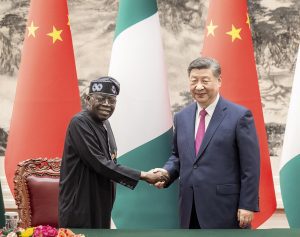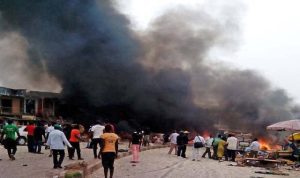Three front runners claim early leads in Nigeria’s Presidential election

Abuja, The Gulf Observer: Each of the three front runners in Nigeria’s hotly contested presidential election claimed Monday they are on the path to victory as preliminary results trickled in two days after Africa’s most populous nation went to the polls.
Only four of Nigeria’s 36 states had officially announced results by midday Monday, with three of those going to ruling party candidate Bola Tinubu. The fourth was won by main opposition party candidate Atiku Abubakar.
Also in the mix as a perceived frontrunner was Peter Obi with the Labour Party. A winner is not expected to be announced until at least Tuesday. After the previous presidential election in 2019, it took four days for officials to declare a victor.
A runoff election will be held if no candidate secures at least one-quarter of the votes from two-thirds of Nigeria’s 36 states and the capital city, in addition to receiving the highest number of votes.
On Monday, the African Union observer mission said voting had been delayed in more than 80% of polling units mainly because of logistical challenges caused by Nigeria’s currency swap program. The redesign of the Nigerian bank note, the naira, caused cash shortages nationwide and voters and poll workers had difficulties getting to polling stations Saturday. Voters in some states had to wait until late in the evening to cast ballots, while in other states the election continued Sunday.
Observers from the missions of the African Union and the West African regional bloc known as ECOWAS said that the election was generally “encouraging” except for isolated cases of violence that disrupted voting in some states.
After Tinubu’s victory in Ekiti state, the incumbent party said it was on course to stay in power.
“If the information we are beginning to receive from various parts of the country is anything to go by, one has every reason to be optimistic that our candidate will win,” Abdullahi Adamu, the party chairman, told the state-run News Agency of Nigeria.
The Labour Party also claimed that it was winning, though Obi has not yet officially won any of the states first announced.
“We are far ahead and we are already leading and we are winning in 24 states,” said Yunusa Tanko, spokesman for the Labour Party. Its candidate, Obi, is a surprise frontrunner in what is usually a two-horse race, with his popularity surging in polls weeks ahead of the vote. The party accused election officials of not being present in their strongholds and said some of their supporters were denied the opportunity to vote.
As the full results haven’t been released yet, analysts caution that early unsubstantiated claims of victory will do nothing but deepen public mistrust of the electoral process and undermine the legitimacy of the polls.
“The claims by the three parties aim to motivate their voters who are urged to protect ballot boxes from rigging. But the unsubstantiated claims of victory increase the risk of protests, both peaceful and violent by disappointed voters,” said Mucahid Durmaz, senior analyst at Verisk Maplecroft, a global risk intelligence company.


